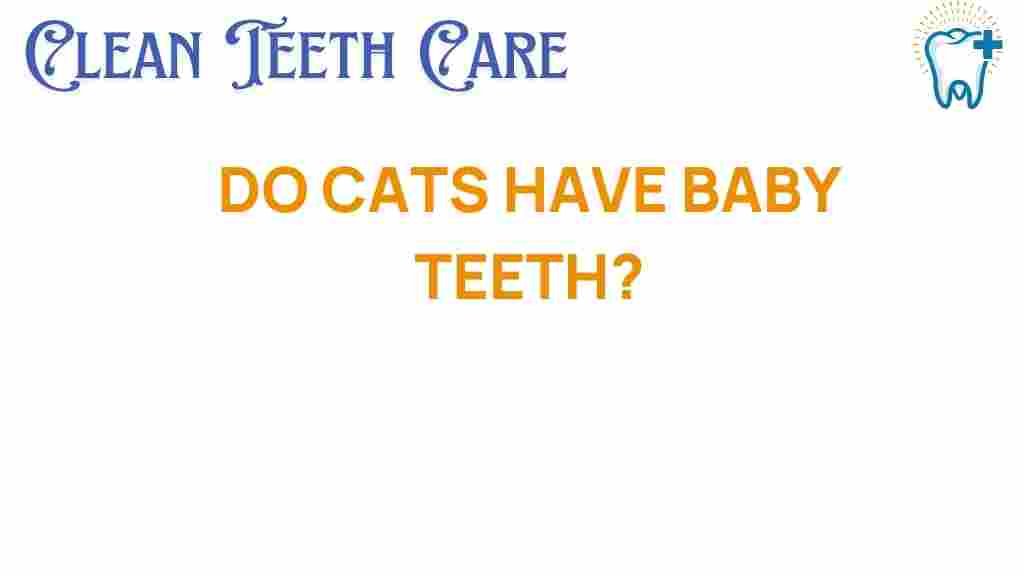Unraveling the Mystery: Do Cats Have Baby Teeth? – Understanding Cat Dental Health
If you’ve recently welcomed a kitten into your home, you might be wondering about their dental development. Just like humans, cats have baby teeth that eventually fall out. In this article, we will explore the fascinating world of cat dental health, focusing on baby teeth, kitten teeth, and essential tips for feline care and oral hygiene. As a pet owner, understanding your kitten’s dental growth is crucial for their overall health and well-being. Let’s dive into the details!
Understanding Kitten Teeth Development
Kittens are born without teeth, but they begin to develop their baby teeth around two to three weeks of age. This stage is essential for their ability to nurse and eventually transition to solid food. Here’s a breakdown of the timeline for kitten teeth development:
- 2-3 weeks: Baby teeth start to erupt.
- 4-6 weeks: All 26 baby teeth should be visible.
- 3-6 months: Baby teeth begin to fall out to make way for adult teeth.
- 6-9 months: Adult teeth are fully developed, totaling 30 teeth.
Understanding this timeline is essential for pet owners to ensure their kittens are developing normally and to seek veterinary advice if there are any concerns.
The Importance of Cat Dental Health
Maintaining good cat dental health is vital for your feline friend’s overall well-being. Poor oral hygiene can lead to various health issues, including:
- Periodontal disease
- Tooth decay
- Infections
- Pain and discomfort
As kittens transition from baby teeth to adult teeth, it’s essential to monitor their oral health and ensure they are not experiencing any issues during this critical time.
Steps to Ensure Healthy Teeth in Kittens
Here’s a step-by-step guide to help you maintain your kitten’s oral hygiene effectively:
1. Start Early with Dental Care
Introduce dental care as soon as your kitten’s baby teeth come in. Use a soft toothbrush designed for kittens or a finger brush to gently clean their teeth. This helps them get used to having their mouth handled.
2. Use Kitten-Safe Toothpaste
Always use toothpaste formulated specifically for cats or kittens. Human toothpaste can be harmful to them. Choose flavors that appeal to cats, such as chicken or fish.
3. Schedule Regular Veterinary Check-Ups
Regular visits to the veterinarian are crucial for monitoring your kitten’s dental health. Your vet can provide professional cleanings and check for any signs of dental disease.
4. Monitor Eating Habits
Pay attention to how your kitten eats. If they seem to be avoiding certain foods or showing signs of discomfort while eating, it may indicate dental issues. Contact your veterinarian if you notice any changes.
5. Provide Chew Toys
Chew toys can help promote dental health by encouraging natural chewing behavior. Look for toys specifically designed to help clean teeth and gums.
Common Dental Problems in Kittens
As a responsible pet owner, it’s essential to be aware of common dental problems that can affect your kitten:
- Retained Baby Teeth: Sometimes, baby teeth do not fall out as they should. This can cause misalignment of adult teeth.
- Gingivitis: Inflammation of the gums can occur if bacteria accumulate due to poor oral hygiene.
- Tooth Fractures: Kittens are playful and curious, which can lead to accidents resulting in broken teeth.
If you notice any of these issues, seek veterinary advice promptly. Early intervention can save your kitten from pain and more severe health complications.
Troubleshooting Dental Care Issues
Sometimes, despite our best efforts, dental care can be challenging. Here are some common issues and how to address them:
Reluctance to Accept Toothbrushing
If your kitten resists having their teeth brushed, try the following:
- Introduce brushing gradually, allowing them to sniff the toothbrush first.
- Use a flavored toothpaste that they enjoy.
- Reward them with treats after brushing to associate it with positive experiences.
Bad Breath
Persistent bad breath can indicate underlying dental issues. If your kitten has bad breath, it’s essential to:
- Check their teeth and gums for signs of tartar buildup or inflammation.
- Schedule a vet appointment for a thorough examination.
Swollen Gums or Bleeding
Swollen or bleeding gums are a sign of gingivitis or other dental issues. In such cases:
- Cease brushing and avoid any hard food until you consult a vet.
- Provide soft food to minimize discomfort.
Conclusion: Prioritizing Oral Hygiene for Your Kitten
In conclusion, understanding that cats indeed have baby teeth is fundamental for every pet owner. Monitoring your kitten’s dental health from an early age can lead to a lifetime of healthy teeth and gums. By following the steps outlined in this article, you can ensure that your furry friend enjoys a healthy mouth and overall well-being.
For more information on feline care and cat dental health, consider visiting this veterinary resource. Additionally, stay connected with fellow pet owners and share your experiences on online pet forums.
Remember, a little effort in maintaining your kitten’s oral hygiene can go a long way in ensuring their happiness and health!
This article is in the category Conditions and created by CleanTeethCare Team
